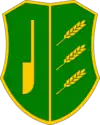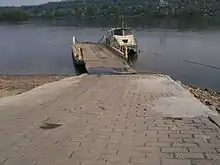Begeč
Begeč (Serbian Cyrillic: Бегеч) is a suburban settlement of the city of Novi Sad, Serbia. It is situated on the river Danube, approximately 15 km west from Novi Sad, on Bačka Palanka-Novi Sad road. According to 2002 census, the village has a Serb ethnic majority and its population numbering 3,360 people.
Begeč
| |
|---|---|
 Seal | |
 Begeč Location of Begeč within Serbia | |
| Coordinates: 45°14′12″N 19°37′23″E | |
| Country | |
| Province | |
| District | South Bačka |
| Municipality | |
| Area | |
| • Total | 43.44 km2 (16.77 sq mi) |
| Population (2002) | |
| • Total | 3,360 |
| • Density | 77/km2 (200/sq mi) |
| Time zone | UTC+1 (CET) |
| • Summer (DST) | UTC+2 (CEST) |
Geography
History
Begeč was first mentioned in the 16th century and its name derived from the Ottoman ruling title "beg" (or "bey") and word "eč" (meaning "village"), hence the full meaning of the name would be "the village of the beg". In Hungarian, the name was spelt Begecs. There is a Serbian Orthodox church dating to 1838 in the village.
Archaeology
The archeological site of Castellum Onagrinum located on the left shore of the Danube includes ruins of a Roman fortress built in the late 3rd century AD. The site is part of the Cultural Heritage of Serbia list, inscribed in 1995.[2]
Demographics
Historical population
- 1961: 2,392
- 1971: 2,608
- 1981: 2,717
- 1991: 2,827
- 2002: 3,360
Transport

Village is connected to Novi Sad by a public bus line 56, which operates daily and connect Begeč with Futog, Veternik and Novi Sad. Village is also on bus route from Bač and Bačka Palanka to Novi Sad.
Besides buses and roads, Begeč is connected by river ferry to village of Banoštor in Syrmia, across Danube river. For pedestrians and bicycles it is free of charge, cars pay toll of 200 Serbian dinars (approximately 2 Euros).
Notable people
- Vujadin Boškov, footballer
- Milan Pavkov, footballer
See also
- List of places in Serbia
- List of cities, towns and villages in Vojvodina
References
- "Насеља општине Нови Сад" (pdf). stat.gov.rs (in Serbian). Statistical Office of Serbia. Retrieved 23 October 2019.
- "Споменици културе у Србији".
- Slobodan Ćurčić, Broj stanovnika Vojvodine, Novi Sad, 1996.
| Wikimedia Commons has media related to Begeč. |

